3ni is in the process of moving over to be led by our partners at Capacity. Sign up to the network to receive our newsletter for more updates.
The national network for neighbourhood improvement (3ni) builds on the evidence base cultivated by Local Trust and partners, focusing on:
-
the role of social infrastructure investment in improving life outcomes
-
the transformative value of community-led neighbourhood renewal
-
best practice partnership-working between local government and communities
Find out more about the key ideas that underpin the network, below.
The Community Needs Index
3ni advocates for community-led regeneration in the neighbourhoods that need it most, including those experiencing the double disadvantage of high levels of economic deprivation and low levels of critical social infrastructure. In 2019, Local Trust worked with the Oxford Consultants for Social Inclusion (OCSI) to develop an objective measure of social infrastructure in neighbourhoods across England. Watch the video to find out more.
Discovery: identifying community strengths, diagnosing neighbourhood needs
Building on the development of the innovative Community Needs Index, 3ni have developed a ground-breaking diagnostic tool in partnership with OCSI called Discovery. A beta version of Discovery was tested at the Local Government Association Conference in October 2024, and is now being further refined.
The tool maps data from the Community Needs Index and its three domains at the hyper-local level, enabling a granular assessment of neighbourhood strengths and needs which can be overlaid with other deprivation data to target investment, inform strategy and to design interventions.
For more information on how this tool can enable local authorities and other public sector agencies to support their approach to policy and practice, or to book a demonstration contact dan@neighbourhoodimprovement.org.uk
Social Capital 2025 series
To mark the 25th anniversary of Robert Putnam’s seminal book ‘Bowling Alone: the Collapse and Revival of American Community’, 3ni have partnered with Demos and Local Trust to produce a new series of papers exploring the role of strong levels of social capital in informing life outcomes at the neighbourhood level.
Read 3ni Director Dan Crowe’s blog on the origins of the Social Capital 2025 series.
Social Capital 2025: The hidden wealth of nations
This first paper by Andy Haldane, RSA CEO and Professor David Halpern, President of the Behavioural Insights Team, examines the economic benefits of strengthening social capital and makes the case for investing in the relationships, networks and trust that underpin strong communities and economies.
Social Capital 2025: A protective shield for children, families and communities
The second report in the series, written by expert academics Adam Coutts and Diego Mauricio Diaz Velásquez, reviews the UK and international evidence on the role of social capital in enhancing children’s and families’ outcomes in disadvantaged areas.
Social Capital 2025: What is Social Capital?
This short briefing note accompanying the second paper looks at where the term originates, the many definitions of social capital, and why the authors alighted on the definition used.
Local Government Association Conference fringe meeting – Summary Notes
In partnership with New Local, this fringe session explored how councils can empower communities to address pressing challenges such as deprivation, overstretched public services, and eroding trust in institutions.
The session also highlighted the importance of social capital and long-term, flexible funding to sustain these efforts.
The notes offer further insights into how community-led approaches can be an essential element in tackling today’s complex challenges.
Read the summary notes
3ni featured in the MJ
Daniel Crowe from the national network for neighbourhood improvement has written a piece featured in the MJ about the 3ni, discussing the aims and works of the network:
“Launching something new is always a nerve-wracking experience, especially when you are building on the legacy of a groundbreaking programme and trying to change the way large institutions approach complex problems. Although it has only been a few months, it is clear there is huge enthusiasm for the national network for neighbourhood improvement (3ni).”
 Our report on local governments’ support strategies at the neighbourhood level
Our report on local governments’ support strategies at the neighbourhood level
This study by Shared Intelligence (SI) examines which neighbourhood approaches local authorities in England are using to support their most disadvantaged areas, based on the Index of Multiple Deprivation (IMD).
The findings show that, while most local authorities analysed adopt some form of neighbourhood working, the type, scale, and council involvement vary greatly. The increasing variation is related to the current financial landscape, with budget pressures in some cases forcing councils to dilute their approach, but also to adopt innovative strategies.
While the report reveals great strength in placing local public services geographically close to residents in order to combat inequalities, it also calls for local authorities to adopt strategies that directly address their most disadvantaged communities.
 Sheffield Hallam University’s Centre for Regional Economic and Social Research Report on the National Strategy for Neighbourhood Renewal
Sheffield Hallam University’s Centre for Regional Economic and Social Research Report on the National Strategy for Neighbourhood Renewal
This report from Sheffield Hallam University’s Centre for Regional Economic and Social Research marks the 25th anniversary of the launch of the Social Exclusion Units seminal report Bringing Britain Together: a National Strategy for Neighbourhood Renewal.
The report looks at evidence on the effectiveness of past regeneration programmes in England, and how they have improved outcomes for many residents living in low income neighbourhoods.
It supports the case for a new approach to neighbourhood renewal and explores what would be needed in order to meet today’s challenges.
The APPG for ‘left behind’ neighbourhoods’ final report on the inquiry into levelling up
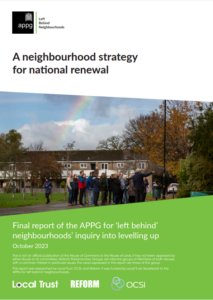
report uses the evidence provided to the APPG during the inquiry into levelling up to outline a
compelling case for remaking the levelling up agenda to put ‘left behind’ areas front and centre of a new mission of national renewal, the challenges of achieving this, and the current levelling up agenda’s ability to help ‘left behind’ communities.
 APPG for ‘left behind’ neighbourhoods report on the UKSPF
APPG for ‘left behind’ neighbourhoods report on the UKSPF
This report by the APPG for ‘left behind’ neighbourhoods reveals glaring regional disparities in UKSPF allocations, with short funding timeframes and turnarounds reducing spending efficiencies across the programme.
It calls for a reformed approach to ensure levelling up spending reflects local priorities in the most disadvantaged areas, including through greater investment in both community engagement and capacity-building.
 Cambridge University’s Centre for Housing and Planning research report on local economic change
Cambridge University’s Centre for Housing and Planning research report on local economic change
This research, from Cambridge University’s Centre for Housing and Planning Research, seeks to identify what drives economic change in deprived areas, and to explore whether the characteristics at the heart of the Big Local programme are factors for success in other initiatives.
The findings support a place-based approach at the neighbourhood level, built on a community-led partnership model.


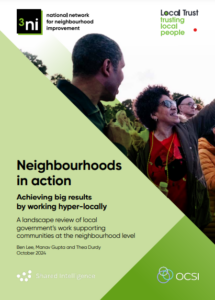 Our report on local governments’ support strategies at the neighbourhood level
Our report on local governments’ support strategies at the neighbourhood level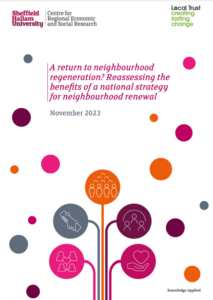 Sheffield Hallam University’s Centre for Regional Economic and Social Research Report on the National Strategy for Neighbourhood Renewal
Sheffield Hallam University’s Centre for Regional Economic and Social Research Report on the National Strategy for Neighbourhood Renewal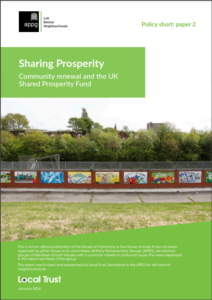 APPG for ‘left behind’ neighbourhoods report on the UKSPF
APPG for ‘left behind’ neighbourhoods report on the UKSPF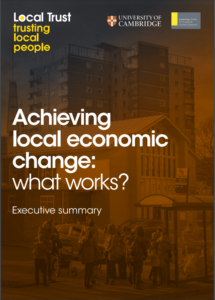 Cambridge University’s Centre for Housing and Planning research report on local economic change
Cambridge University’s Centre for Housing and Planning research report on local economic change